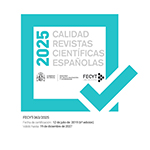Feminist Critical Discourse Analysis of Gender Discrimination in El cuarto de atrás
Abstract
Main objective. This article examines the narrator-protagonist's discourses on discrimination against women in the context of the first period of Franco's dictatorship in the novel The Back Room by C. Martín Gaite and answers the research question: What are the author's discursive strategies to represent gender discrimination in the text? Methodology. The study examines these discourses through a Feminist Critical Discourse Analysis based on two discursive levels (macro-strategies and micro-strategies). Results. The analysis has shown a series of discursive strategies employed by the author to portrait discrimination against women in the text, such as the use of certain discursive themes (direct and indirect comments from society and the institutions), subgenres (romantic novel, autobiography, memoir) or intertexts (cinema, music). Discussion and Conclusions. The study reveals the author's criticism of the repression and the monological gender models established by the Regime through her reaction to the power structures (the Sección Femenina). The narrator offers an alternative story to the official one and she is the voice of a generation of women who had to mentally escape to resist the Spanish post war propaganda.
Downloads
Article download
License
In order to support the global exchange of knowledge, the journal Investigaciones Feministas is allowing unrestricted access to its content as from its publication in this electronic edition, and as such it is an open-access journal. The originals published in this journal are the property of the Complutense University of Madrid and any reproduction thereof in full or in part must cite the source. All content is distributed under a Creative Commons Attribution 4.0 use and distribution licence (CC BY 4.0). This circumstance must be expressly stated in these terms where necessary. You can view the summary and the complete legal text of the licence.











